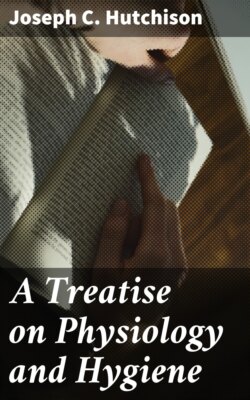Читать книгу A Treatise on Physiology and Hygiene - Joseph C. Hutchison - Страница 8
На сайте Литреса книга снята с продажи.
Оглавление29. Need of repose? How do we obtain rest? Alfred the Great? The eight-hour division of time?
29. Rest.—We cannot always be active: repose must succeed labor. We obtain this rest partly by suspending all exertion, as in sleep, and partly by a change of employment. It is said that Alfred the Great recommended that each day should be divided in the following manner: "Eight hours for work, eight hours for recreation, and eight hours for sleep." This division of time is as good as any that could now be made, if it be borne in mind that, when the work is physical, the time of recreation should be devoted to the improvement of the mind; and when mental, we should then recreate by means of physical exercise.
30. Cessation of voluntary activity? Temperature of the body? Consequence? Body and mind during sleep? Nutrition? Describe it. Consequences of insufficient sleep?
30. During sleep, all voluntary activity ceases, the rapidity of the circulation and breathing diminishes, and the temperature of the body falls one or two degrees. In consequence, the body needs warmer coverings than during the hours of wakefulness. During sleep, the body seems wholly at rest, and the mind is also inactive, if we except those involuntary mental wanderings which we call dreams. Nevertheless a very active and important physical process is going on. Nutrition, or the nourishing of the tissues, now takes place. While the body is in action, the process of pulling down predominates, but in sleep, that of building up takes place more actively. In this way we are refreshed each night, and prepared for the work and pleasures of another day. If sleep is insufficient, the effects are seen in the lassitude and weakness which follow. Wakefulness is very frequently the forerunner of insanity, especially among those who perform excessive mental labor.
31. Amount of sleep in different persons? Cases? Frederick the Great? Bonaparte? Instances of long deprivation of sleep?
31. All persons do not require the same amount of sleep, but the average of men need from seven to nine hours. There are well-authenticated cases where individuals have remained without sleep for many days without apparent injury. Frederick the Great required only five hours of sleep daily. Bonaparte could pass days with only a few hours of rest. But this long continued absence of sleep is attended with danger. After loss of sleep for a long period, in some instances, stupor has come on so profoundly, that there has been no awaking.
32. Instances of sailors? French soldiers? During torture?
32. There are instances related of sailors falling asleep on the gun-decks of their ships while in action. On the retreat from Moscow, the French soldiers would fall asleep on the march, and could only be aroused by the cry, "The Cossacks are coming!" Tortured persons are said to have slept upon the rack in the intervals of their torture. In early life, while engaged in a laborious country practice, the writer not unfrequently slept soundly on horseback. These instances, and others, show the imperative demand which nature makes for rest in sleep.
QUESTIONS FOR TOPICAL REVIEW.
| PAGE | |
| 1. What can you state of the number and division of the muscles? | 25, 26 |
| 2. Describe the structure of the muscles. | 25, 26 |
| 3. Their arrangement in pairs and consequent action. | 26 |
| 4. What is the difference between the motion called flexion and that called extension? | 26 |
| 5. Describe their action, and state which are the more powerful. | 26 |
| 6. What is the difference between voluntary and involuntary muscles? | 26 |
| 7. Illustrate the difference between the two. | 26 |
| 8. State all you can of the tendons or sinews. | 27 |
| 9. What is meant by contraction of the muscles? | 27, 28 |
| 10. In how many and what ways may contraction be effected? | 28 |
| 11. What is stated of after-death contraction? | 28 |
| 12. Why cannot a muscle in life continue contracted a long time? | 28 |
| 13. How then can the constant beating of the heart be explained? | 28 |
| 14. How does the strength of a man compare with that of a horse? | 29 |
| 15. What can you state in relation to the relative strength of animals? | 28, 29 |
| 16. What, in relation to physical strength? | 29 |
| 17. What, in relation to physical degeneracy? | 29, 30 |
| 18. What, in relation to the importance of exercise? | 30 |
| 19. What is the effect of exercise upon the heart, skin, and appetite? | 30, 31 |
| 20. How does exercise affect the current of the body's circulation? | 31 |
| 21. How does judicious exercise affect the muscles? | 31 |
| 22. What is stated of violent and spasmodic exercise? | 31 |
| 23. Of the exercise of walking? | 31, 32, 33 |
| 24. Of running, leaping, and other modes of exercise? | 32 |
| 25. Of physical culture, in connection with out-door exercises? | 33 |
| 26. Of the importance of gymnastics in our schools and colleges? | 33, 34 |
| 27. Of the importance of rest from labor or exercise? | 38, 39 |
| 28. What processes take place during sleep? | 39 |
| 29. What effects follow insufficient sleep? | 39 |
CHAPTER III.
